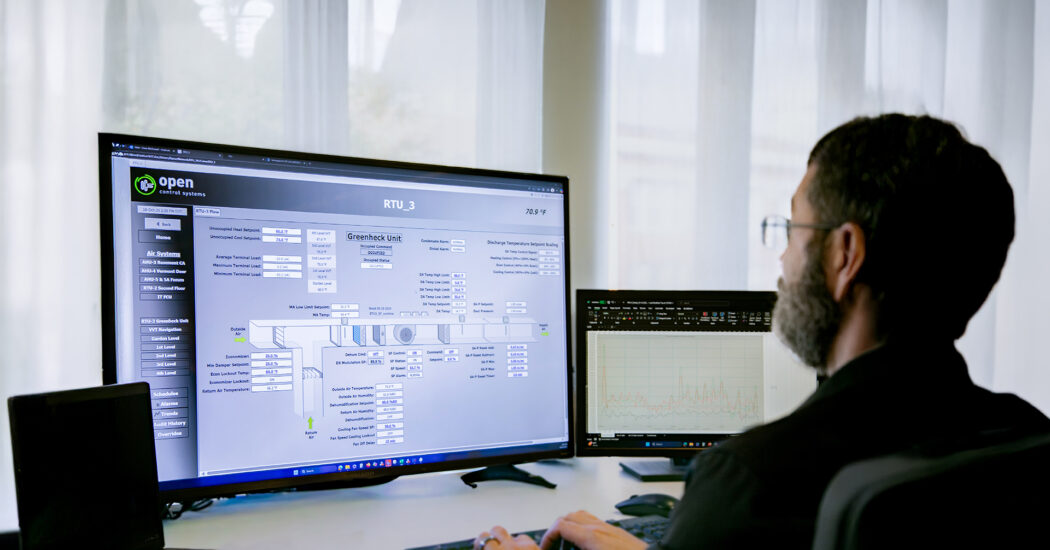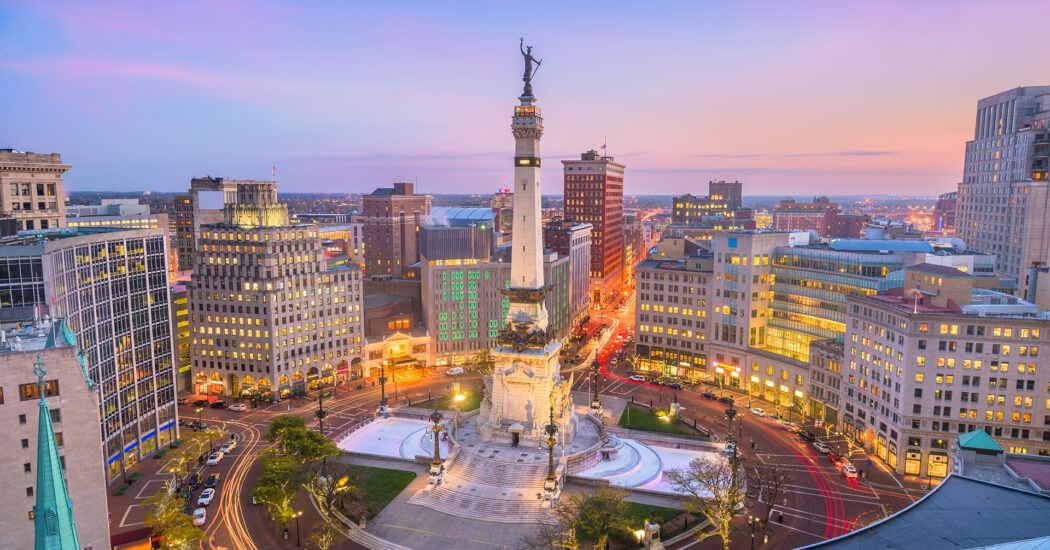A Unique Understanding of Community: A Conversation with Alan Witchey
-
Category
Studio-Community, Perspectives, Innovation, Leadership -
Posted By
Schmidt Associates -
Posted On
Oct 09, 2023
You have a masters in fine arts, which is not a normal progression toward becoming the CEO of an AIDS services organization. Tell me how you got from there to here.
If you asked my mother, she would tell you that I wasn’t a normal child. I’m dyslexic, and that I think drove my journey in a different direction, because when you’re dyslexic, you spend a lot of time trying to figure out how to do something in a different kind of way that everyone else does normally because the world is a little bit different. It’s about how you can make connections to things, even auditorily as well as visually. I feel like at an early age, I learned how to make unique connections between things differently, so I’m always saying, “hey, I learned this. Can I apply that over here? Can I take this one thing and connect it to this other thing?” So, that led me on a more creative journey. I frequently get calls from students in MBA, nonprofit management and public health programs wanting to interview me, and I always say that it had nothing to do with my education. But the arts make you think differently and give you a perspective that you don’t get locked into and you see things bigger picture and in different ways.
It sounds like what you’re describing is design thinking. Who helped you figure out where you wanted to go and take that design thinking and unique ability in the direction that you did?
I was always in the lower classes and one day, I was sitting with a bunch of kids who had failed math. I had a teacher who said, ‘if you don’t pass this test, you can’t go out for recess. I didn’t want to be inside, so I just did it. The next day, the teacher said, “you got everything right.” So, I went from the medial to the advanced class overnight, and I had a teacher who told me I was behind because of where I had been, but that I just had to do it. She was hard in that while she said I was capable; she also didn’t give me any leeway. And that’s how I led my life. Life is hard, it’s complicated. Nothing ever came easy to me, but I don’t know that it’s unique. So, what I learned from that teacher is you just must jump in and do it, no matter how intimidating or difficult – and if you start, you get somewhere. I always think that the difference between someone who was successful and someone who wasn’t is that one person quit and the other didn’t.
Those teachers positioned you in place where you could go to Indiana University, Antioch, and from there to California?
Yeah, so it’s strange. I worked at the Damien Center, but there’s a much bigger story. When I was younger, I started volunteering after my undergraduate degree, and I knew a lot of people who were dying. Some of my friends had gotten HIV, and people would just disappear. At that time, there weren’t a lot of medications, and it was scary, so as a gay man, you were inspired to try and step up and help your friends and your community because there wasn’t a lot of help available, so I was volunteering a lot at a young age, even though I started with a marketing job in a for-profit organization, I was volunteering, and realized I loved this, and I wanted to do it. So, I had to quit this for-profit job, and transition into the nonprofit world, and at the same time, taking a pay cut and I’m trying to figure out how to balance my life now to make less money, but have more meaning, and I really had to make the choice to do that. So, then I worked for the Damien Center, and after several years, I went to California, which I always want to do because they have ocean, desert, and mountains. Nowhere else in the United States have all three, so I loved it, but it was very expensive. But that was my first job as a CEO, working for AIDS Services Foundation. It was like Damien Center in a lot of ways, but out in California, they have resources and money, and state funding. Suddenly, you realize, “Oh my Gosh, we’ve been starved of resources.” So when I came, it was amazing to see the difference between California and Indiana who wasn’t putting any tax money to supporting a safety net, and to go to the place where they were putting money into the safety net and it was extraordinary how much help you could provide—mental health, more food support, everything. So, there was less of a struggle. I feel like what I learned from that was. “Ok. Here’s a bunch of money. What would you do with it?” After about five years of doing this, I adopted my daughter and I wanted her to live in the Midwest and know my family, but I also wanted to come back and make a difference in my community and the state where I grew up. I do think that people get frustrated and leave states with low resources for social services, and they have a good experience elsewhere, but I wanted to come back Indiana. I worked for the United Way of Central Indiana for a little bit, and then I was CEO of the Coalition for Homelessness where I spent a lot of time trying to figure out how to get more resources, and what I realized that Indiana is a very resource-poor state in how we address homelessness. A lot of that was that were hadn’t organized well or thought about how we were going to increase the money. Instead, we were just focused on how to best use the money we were allocated. That’s different than leveraging the resources to get more resources, so that we can help more people and do more work. That’s harder to do.
Why did you move from the Coalition for Homelessness to the Damien Center?
I wasn’t job hunting, but my predecessor had left. The board was doing a search, and they approached me. It was funny because I had no idea what this meeting was about, only that they wanted to talk with me. So, I went, and they said they wanted me to think about becoming the CEO of Damien Center. I told them that I wasn’t interested and was really focused on homelessness, and they asked what it would take to get me. I told them I was in the middle of a bunch of projects and couldn’t walk away, and they asked me how long the projects would last. I told them ten months to a year, and they called me again. They had me interview with the full board, and things went fast. Within a week and half-two weeks, they offered me the job. I couldn’t say not. It just seemed like the right thing. In life, you don’t often get to go back and redo something. I don’t believe in going back, and I didn’t go back. Because of what I learned, I was able to come back in a different way because I knew things and could leverage that, and I have been able to take the organization to a new place.
With your connections across different social services organizations how do you develop partnerships with other organizations?
So often, people get siloed in their mission or cause, and there are a lot of different intersections. For instance, the work we do with HIV intersects with domestic violence, human trafficking with public health with homelessness and re-entry, and addiction populations. At Damien, we are a partner in these responses. So, when you start thinking broadly, you find other partnerships, other funding, and other ways to do it. To prevent other issues, you must ask what this has to do with Damien Center’s mission. The truth of the matter is that looking at everything is the best strategy to prevention. So, to work in the field and be genuine in saying we want to prevent HIV, you must help and partner with others. You must be willing to see yourself as bigger than what you might otherwise.
You mentioned when you started volunteering, there was a fair amount of fear. How did you overcome this?
Yes. There was, and even I was afraid. Back in the day, we didn’t fully understand how HIV was being transmitted. But I distinctly remember being at IU as an undergraduate and thinking HIV was a east and west coast disease, and that in the Midwest, we weren’t in danger, unless we went to the east or west coast. That was the mentality back them and little did we know that the disease would explode and suddenly, we would know a lot of people with HIV. But there was this moment where it was happening somewhere else, and in that one moment, you felt safe and life didn’t seem real, and then it exploded. That was a weird moment because when there is crisis, that’s when you see what you’re made of because nobody knows how to respond, but you can do something. There was a group who said they wanted to help, they wanted to find out what was happening and how to make a difference. We were running hotlines for people who were scared, suicidal, or sick, we were doing 1:1 support for people and caring for and driving them around places. There was no system in place or medications, and there was wait list. I remember at one time, there was a wait list for insurance, and you had people that you knew wouldn’t make it because they weren’t on the wait list, and you couldn’t get them on because the list was hundreds of people long. So, I was very involved in Indiana Youth Group, and a lot of different programs at a grassroots level. I think this helped formulate a lot of my career because when you’re working at a grassroots level, you ask what you can do with very little resources and funding, and you learn how you can have a significant impact on individuals. I still think about that all the time. My job, even today, is to facilitate and make a difference individual-by-individual because that’s how you make a difference.
One of the hardest things you and your staff must do is build trust with vulnerable populations. How do you do that and how do you coach that in your staff?
You must be willing to listen and take advice from others who understand what it’s like to walk a certain journey that you may never understand. You also must be willing to share power and challenge yourself to think about things differently. Across the board, you must be open to hearing other peoples’ voices and being open to thinking about it in a different and being open to the idea that you need to make a change, no matter where you are, or where you’re coming from. There are things that you don’t know, but there are things that you can enhance and improve. Part of leadership is knowing how to make decisions and accepting input and feedback. Other people know their journeys and if you want to help them, you must walk beside them.
What does the future of the Damien Center look like and how will you work to expand services?
There are many people who are out of care and even more who don’t even realize they’re HIV+ in Marion County, specifically. To me, that a symbol of what it’s like working with vulnerable populations. AS we move forward, we must figure out a way to work with people who are already engaged and how to enhance services. But we also have to understand how to work with the other groups to get them engaged and get them help because we know that if you’re HIV+ and taking your medicine, you can be virally suppressed and live a healthy life, but if you’re not, you can live a sick and painful life and you want as many people as possible to be virally suppressed because that’s the sort of undetectable equals non-transmittable point where you can live healthy. Our hope, regardless of whether our clients have HIV or not is to the services and care that we’re doing. There are things that we aren’t doing now, but would like to do in the future, such as providing dental care. We did a survey among our clients, and 20% said they hadn’t been to a dentist in over five years, and half of them hadn’t been in the last year, and this was pre-pandemic. So, there are a lot of ongoing needs that people have that are hard to access. We’ll continue to assess the needs and offer them. But we’re out of space at our current location, and we’re working on a new headquarters. There’s much more to do and we’re not done yet. Even if the HIV epidemic was done, most of our clients would still need our help because they would still be struggling with things like addiction, mental health, housing, food insecurity—all kinds of things. These issues all cross over into HIV, and things are heightened, so there is a greater need. We really want to look at these intersections and say, ‘ok who needs the help the most, and do we work upstream?’ How do we help in preventing the spread of HIV? How do we prevent things from becoming more severe? So, we’re really hoping to focus on some of those things.
So, you did this survey pre-pandemic with a population that is living within an epidemic. What did you learn from this that will helpful when the next pandemic surfaces?
When COVID came around, we were a little bit more prepared than the average person. We were not totally prepared, but better prepared because we were already living within a pandemic. So, now we have COVID and monkey pox, but we got better with each pandemic. So, when monkey pox came along, we said we really need to vaccinate as many people as possible because it was disproportionately affecting our population, so we were able to respond with vaccinations and testing that pre-COVID probably would have taken us a while to figure out, but we were able to get vaccines and two days later, start vaccinating people. I think that’s what we have learned is how to be nimble and respond to situations as they come. What we do is help people when they need us most, and we are here for them. It feels good to be able to do this.
As a leader, how do you take care of yourself to make sure you can continue doing so much for others?
I like to go to concerts and festivals, and I try to spend time with my daughter, family, and friends. I also take time to just not think about work. Your brain needs a rest. I also love to walk my dogs.
What’s something you’re currently reading or that’s on your list?
Right now, I’m reading Happy Mind, Happy Life: 10 Simple Ways to Feel Great Every Day by Dr. Rangan Chatterjee who is an interesting doctor who’s into health and wellness in different ways. He thinks we got a lot wrong, but this book discusses how mental health ties into our work. I stated reading this because my mother who is 92 years old and living in Fort Wayne is struggling physically, and it’s affecting her mental ability, and I thought this book, because it’s simplistic, would be a good one to read together, which we are doing. It’s a book club with my mom.
*Excerpts from this Q&A were taken from a podcast episode with Witchey in September 2022







